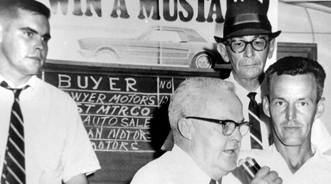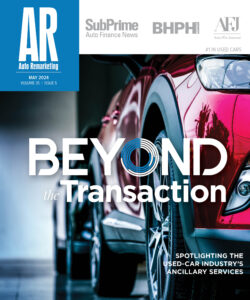Strong Connection to Industry’s Foundation Still Flows Through Auction Business

There’s a funny story Jason Hockett recently heard from his father, Mike Hockett.
When Mike was a partner at ADE in Indianapolis during the mid-1980s, there was an older man named Tom who delivered cars for the auction.
“One day my dad received a phone call from Tom saying that his car had just gone through the front window of a Kentucky Fried Chicken,” Jason said. “My dad asked Tom what happened, and Tom replied, ‘I stopped for some chicken and my car followed me in.’”
You’re likely to find yarns like these spun throughout the history of the auction industry, a business full of stories of colorful characters, personality and life, but also rich tradition and entrepreneurial innovation.
Perhaps at the heart of that history is Jimmy Rawls, whose father J.M. Rawls founded what is considered to be the nation’s first auto auction 75 years ago.
Jimmy is the owner of Rawls Auto Auction in Leesville, S.C., which celebrated its 75th anniversary this summer, and is someone Black Book vice president and North American auction director Tim West calls a “phenomenal operator” and “one of the best” in the business.
“One of the benefits that dealers who come to Rawls Auto Auction have is that Jimmy’s a car guy,” said West, who has know Jimmy for 29 years. “He’s one of them. You can see by his collection of older cars that he’s a car guy; he thinks like they do; he buys and sells cars himself.
“So, he understands the position they’re in and certainly understands the business from that standpoint.”
Now, about that car collection of Jimmy’s.
Such classics as a 1938 Ford Woody and a 1939 Mercury were among the memorabilia adorning the lobby space of Rawls Auto Auction when Auto Remarketing paid a visit on the day of its 75th anniversary sale.
A yearbook’s worth of photographs going back more than a handful of decades to tell the visual story of the auction wrapped the walls of the lobby, and a quote from 1957 was found in at least a couple spots throughout the facility.
“Be wise, sell on today’s market,” it read.
While the origins of today’s market first emerged before Jimmy was born, it’s a story that’s part of his lineage and one with which he’s greatly familiar.
J.M. Rawls, who was already in the car business, got the idea of selling used cars via the auction method from attending livestock sales. Rawls Auto Auction would then take flight in 1938.
“We had a lot of dealers that lived in our little area (of South Carolina) that went up north and bought cars and brought them back to sell. They felt like they had a market, because cars were real scarce pre-war,” Jimmy said, referring to the years just prior to World War II. “So they’d have a sale on Tuesday, run them through the building and sell them.”
That building the sale began in was a downtown theater building with just one lane.
The auction itself is at a different location today and includes seven lanes, but that original theater is still there today, Jimmy said.
“It was a used-car garage and sales … So, they had the idea for (the auction), and they went on one side and busted a door out. They went on the other side, busted that one out to where the car could come straight through,” he said.
The auction block was set up at the back of the building, and the cars were parked out on the railroad track.
“When they finished with the auction, they would close the doors back and it was a repair garage,” he added.
In the earliest days, Jimmy said, folks were curious if the concept of selling a car via auction would even work. Some thought J.M. was “crazy,” and others got behind him.
To market the auction, J.M. got a car, put his auction’s name on it, and then traveled around to spread the word to dealers. He had his most success with dealers out of Georgia.
“The first few sales weren’t very good; they had about 25 cars,” Jimmy said. “They’d re-run them about four times, so they could say they had a hundred.
“But it built up really fast. It wasn’t a year before they were running 300 or 400 cars a week,” he added.
Not to mention, the sales rate was in the high 90s, Jimmy said, noting, “Dealers were coming from ways away just to get these cars.”
It wouldn’t be long before more auto auctions sprouted up, and just 10 years later, the National Auto Auction Protection Association — the precursor to the National Auto Auction Association — was formed.
As for Jimmy history’s in the business, he started hanging out at his dad’s auction when he was a youth.
“I wanted to drive cars — I loved cars — but I was 12 and I couldn’t get a license until I was 14. So I drove anyway,” Jimmy said. “He’d catch me out there driving and get on my ass, ‘Get out of the car; don’t have any insurance.’”
While Jimmy drove the cars through the lanes in those days as a youngster, “I didn’t let him know.”
“Some of the dealers told me that when I was driving through you couldn’t even see me,” he added
When he was 15 or 16, Jimmy got more involved in the business, buying a couple cars, fixing them up and running them through the lane. After college and military service, Jimmy would take on auction management in 1967. A year later, following J.M’s passing, Jimmy was given an ownership position and would obtain 100-percent ownership in 1984.
The level of competitiveness would ratchet up in the auction business compared to the early days, along with other industry shifters that would change how the industry operates, such as corporate ownership, online sales, access to information and so on.
But some fundamental elements haven’t changed.
One particular nugget from Jimmy illustrates that.
Though the auction doesn’t really use these much anymore, it began sending mail-outs decades ago. They were sent out once a week and had a message at the bottom.
“And the message would be like, ‘The weather was good Tuesday. Sales were strong … We still need cars and buyers,’” Jimmy said. “I said, ‘Hell, that’s 50 years ago, but that’s still true.’”
What also appears to stand true still today at Rawls Auto Auction today is the family atmosphere. That’s something that ringman Phil Gee has observed in his 17 years working for Jimmy.
“He’s really easy to work for. He understands the auction business; he understands what we do,” Gee said. “It’s all family. They treat you like family; he’s good to his employees, takes care of the dealers … they’re just fun to work for.”
Part of that sentiment was reflected by Bill McIver, chief executive officer of American Auto Auction Group, when asked about the industry as a whole, and comparing the commonalities between today’s auction environment and yesterday’s.
Granted there are multitudes of differences — McIver cited several — but there are some fundamental elements to success in the auction business that aren’t all that different than during the early days that Jimmy Rawls talks about.
“Many things have remained the same: ‘courtesy,’ ‘commons sense,’ ‘integrity,’ ‘relationships,’ ‘adding value;’ they all sound like buzz words but they have always been fundamental to the success of any auction,” McIver said.
“They also act as differentiators, as buyers and sellers have long memories and lots of options,” he added.
“Auctions have always had the challenge of making both buyer and seller happy. To add to the equation, the buyers are car dealers, some of the brightest most successful sales people and entrepreneurs in the world. They can quickly see the value (or lack of value) in any relationship and hold auctions to exacting standards of fairness and integrity,” McIver continued.
“Likewise, the large consignors have plenty of options and channels available and better technology to measure the effectiveness of each. We all realize and understand the value of relationships, but the best way to make a good relationship a great relationship is to constantly look for ways to add value to the customer’s bottom line.”
Jason Hockett, ABC’s president, has been in the car business for 23 years. Like Jimmy Rawls, his childhood memories are filled with the auction business, checking out the auction on Saturdays while his dad worked.
He, too, has a firm understanding of how the business and its best practices have evolved over the decades — but he realizes the strong connection to the past.
“Some of the processes that the prior generations started with have proven to be the most effective. They created a carnival atmosphere and hired auctioneers and ringmen to provide the urgency in purchasing a vehicle,” Hockett said.
“As auctions, we still put numbers on the vehicles, park them for display and run them through the lanes on auction day,” he added. “There are cheaper ways to sell a vehicle, but I think the prior generations of auction owners got it right.”
Joe Overby can be reached at joverby@autoremarketing.com. Continue the conversation with Auto Remarketing on both LinkedIn and Twitter

 View The Latest Edition
View The Latest Edition

